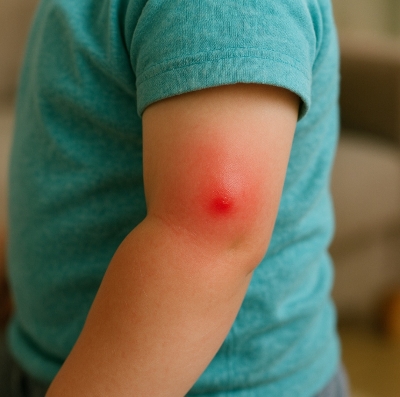Hello, today we’ll be discussing Skeeter Syndrome, an allergic reaction that can occur from mosquito bites, especially in the summer. This condition can be more severe in children, so prevention and proper management are essential. In this article, we’ll go over the causes, symptoms, treatment methods, and preventive measures in detail.
📌 Table of Contents
1. What is Skeeter Syndrome?
2. Causes of Skeeter Syndrome
3. Main Symptoms
4. Diagnosis
5. Treatment and Management
6. Prevention
7. Skeeter Syndrome and Growth
8. Differences from Other Insect Bites
9. How to Handle Severe Cases
10. Natural and Home Remedies
11. FAQ
12. Conclusion
---
1️⃣ What is Skeeter Syndrome?
Skeeter Syndrome is a severe local allergic reaction caused by mosquito bites. Unlike typical mosquito bites, the affected area may swell excessively and be accompanied by fever and pain. It tends to be more pronounced in young children and individuals with weakened immune systems.
---
2️⃣ Causes of Skeeter Syndrome
The syndrome is caused by an immune system reaction to mosquito saliva, which is injected during a bite. This saliva contains anticoagulants and analgesic agents. Some people’s immune systems overreact to these substances, leading to noticeable allergic symptoms.
---
3️⃣ Main Symptoms
Excessive swelling and redness at the bite site
Severe itching
Blister formation
Warmth and pain around the area
Sometimes hives or rashes
Rarely, fever and swollen lymph nodes
Tip: The swelling is much larger and more severe than typical mosquito bites.
---
4️⃣ Diagnosis
Skeeter Syndrome is diagnosed based on clinical symptoms. If there is intense swelling and redness shortly after a mosquito bite, the condition can be suspected. Allergy testing may also be used to confirm sensitivity to mosquito saliva.
---
5️⃣ Treatment and Management
Cold Compress: Helps reduce swelling and ease itching
Antihistamines: To suppress the allergic reaction
Steroid Creams: Reduce inflammation and itching
Anti-inflammatory medications: Relieve pain and heat
Avoid scratching: Prevents secondary infections
Mupirocin ointment (e.g., Bactroban): Helps prevent secondary infections and manage wounds
Tip: Young children often scratch, so keep nails trimmed and consider gloves if necessary.
---
6️⃣ Prevention
Use mosquito nets: Even indoors for protection
Wear long clothing: Especially during outdoor activities
Use mosquito repellents: Products with DEET or Picaridin are effective
Regular pest control: Remove standing water and eliminate breeding grounds
Tip: Mosquito activity peaks in early morning and evening—try to avoid outdoor activities during these times.
---
7️⃣ Skeeter Syndrome and Growth
Most children outgrow Skeeter Syndrome as their immune systems develop. Over time, their bodies build a tolerance to mosquito saliva, and the allergic reactions become less severe. In general, the symptoms diminish with age and become less concerning.
---
8️⃣ Differences from Other Insect Bites
Although Skeeter Syndrome is unique to mosquito bites, it can be confused with bites from bees, ticks, or ants. Bee stings cause significant pain and swelling. Tick bites may come with fever and rashes. Ant bites can form blisters but usually do not cause the severe swelling associated with Skeeter Syndrome.
---
9️⃣ How to Handle Severe Cases
While most cases of Skeeter Syndrome subside naturally, rare severe reactions such as breathing difficulties, widespread rashes, or high fever require immediate medical attention. In emergencies, taking antihistamines and applying cold compresses can provide initial relief before seeing a doctor.
---
🔟 Natural and Home Remedies
Oatmeal baths, aloe vera gel, and cool towels can soothe the skin
Lavender oil or citronella oil may be used as natural mosquito repellents
---
❓ FAQ
Q1. Who is more likely to develop Skeeter Syndrome?
A1. Infants, individuals with weak immune systems, and those with allergic tendencies are more susceptible.
Q2. How is it different from a regular mosquito bite?
A2. The swelling is much more intense, and it may involve fever and severe pain.
Q3. Is Skeeter Syndrome contagious?
A3. No, it's an allergic reaction. Only the bitten person experiences symptoms.
Q4. What is the most effective prevention method?
A4. Using repellents, mosquito nets, and wearing long clothing are effective preventive steps.
Q5. Is it safe to take antihistamines every day?
A5. Consult a doctor if symptoms are severe. It’s best to take them only when needed for symptom relief.
Q6. Can blisters form in Skeeter Syndrome?
A6. Yes, in more intense allergic reactions, blisters can form. Wound care is important, and applying Mupirocin ointment can help prevent infections.
Q7. What is the role of Mupirocin ointment?
A7. It helps prevent secondary infections and protects the wound site, especially when blisters are present.
Q8. What should I do if the condition becomes severe?
A8. If symptoms like difficulty breathing or full-body rashes occur, visit a hospital immediately. Antihistamines and cold compresses can be used temporarily.
---
🔍 Conclusion
Skeeter Syndrome often improves naturally over time. With careful prevention and management, mosquito bites can be effectively avoided. My child also suffered from Skeeter Syndrome during early childhood, but the symptoms disappeared as he grew. Now, even mosquito bites in summer no longer cause swelling. With attentive care from parents, children can grow up healthy and comfortable. Stay safe and enjoy a mosquito-free summer!
